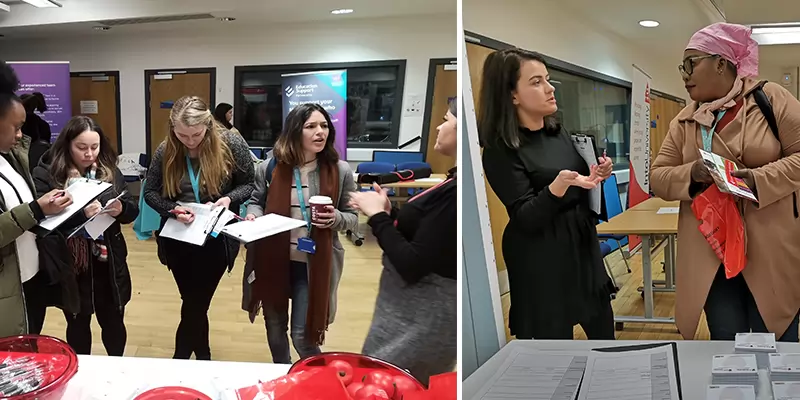TLTP Education NQT Recruitment Events
Throughout the year TLTP Education attend university recruitment fairs meeting enthusiastic students who are studying for their PGCE and BA Education degree and will soon be looking for their first teaching role as a Newly Qualified Teacher.
Each year we help hundreds of NQTs start their teaching career in all divisions of education, including: Early Years, Primary, Secondary and SEN.
We have an extensive network of schools all of which we work closely with on a regular basis. As a result, we are able to gain valuable insight into their school’s requirements, needs and ethos. Which, in return we are able to closely match with suitable candidates.
Over the past four months TLTP Education have been very busy visiting universities including:
- University of East London
- St. Mary’s University
- Roehampton University
- Cambridge University
- University College London – Institute of Education
- Bedfordshire University


It’s been a pleasure meeting bright and talented graduates and we are looking forward to meeting many more.
We are continuing our tour and will be visiting Goldsmiths University on Thursday 13th February 2020 and Greenwich University Friday 14th February 2020.
On a daily basis we are liaising with schools across all of London and the Home Counties to understand their NQT vacancies, therefore we are receiving new roles constantly. Schools are keen to get ahead of the game to secure talented graduates, and, as a result interviews are now being scheduled.

If you would like to be informed as soon as a new job opportunity is available, please Register and subscribe to job alerts to ensure you never miss our latest roles. Alternatively, contact us on 020 8709 6540 and a consultant can talk through your individual requirements.
If you prefer for us to call you, no problem. Simply, click here to fill in a few details and a member of the recruitment team will be in touch.
We can help ease the stress of finding your ideal NQT role, give you maximum exposure to the job market, and more importantly leave you to focus on completing your PGCE!
Tips for early career teachers
So you have completed your PGCE and have enjoyed a well-rested break from studying and teaching, what could possibly go wrong?
What may, at first, seem like a smooth-sailing and exciting ride can easily turn into a daunting experience, but only if you allow it.
Whether it’s the challenge of managing a room full of children or the excessive workload that’s bound to come your way, it is all part of the experience and the key is managing it.
So, to help prepare you for the eventful journey you are about to embark on; here are our top 7 tips on how to survive and succeed in your first academic year as an ECT.
Discover and hone your own teaching style
If you’re an overly excited ECT, you have probably spent your summer going through an archive of different teaching methods that you will most likely adopt for your first year. Most ECTs have an innate sense to employ traditional teaching styles for their induction year, and while this approach is often handy; it is also important to test the waters and approach new theories. Don’t forget, your classroom, your rules. But before introducing any contemporary methods to the classroom; why not read up on evidence-based research, over the summer break, to ensure the techniques are effective. Fostering a new approach is only useful when it’s easy for students to grasp, and when it proves to make a positive impact to the atmosphere and learning in your classroom.
Work-life balance
It is very common for ECTs to fall into a habit of working outside school hours, but in doing so you are causing extra stress to your workload. Managing work and social life is easier said than done; however, it is vital to prioritise your well-being over anything else. Whether it’s going for a morning run or taking the evening out to spend quality time with family and friends; balancing work and social life is the key to a happy and healthy teacher.
Don’t be afraid to say no
Saying no to colleagues that are contributing to your workload and stress levels does not mean you’re weak, nor does it define your capabilities as a teacher. Rejecting extra work that prevents you from having a social life is not something to feel guilty about, and your colleagues will not think any less of you if you communicate this in a friendly and professional manner.
Asking for help is not a sign of weakness
Talk about your doubts and don’t be afraid to seek further help. As an early career teacher, you are still trying to adapt to the school environment and often when managing 30 kids or more, it is expected for things to spiral out of control. But before second-guessing your chosen career or your teaching abilities, contact your mentor. They are there to help make your experience feel less complexed, so why not tap into their wisdom and make use of their assistance. Observing colleagues is a great way to identify new teaching techniques and improve your own practice.
Teach with enthusiasm
According to a 2015 class if you demonstrate the same excitement and passion you expect from them.
Socialise with colleagues
Being a new teacher in school is just as nerve-wracking as being the new pupil. Overcome your nerves by socialising with colleagues at lunchtime or outside the school grounds. Find out what their plans are after school or ask about the staff societies available to discover your interests. Whether it’s the staff football team or perhaps you enjoy a nice visit to the pub, be open-minded and invite your new colleagues for a chance to get to know them better.
Accept and embrace your mistakes
As an ECT, you are still in the early stage of your career. Therefore, it is certain that a few slip-ups will be made along the way, but that’s also okay. It is important to recognise and accept your mistakes, as this will guide you when reflecting on what went wrong and help improve your practice. Revisit and explore old notes from your PGCE training course on teaching and learning theories. Alternatively, get in touch with your mentor and discuss candidly your mistakes. Remember, they are not there to pass judgment but merely to offer some assistance.
Teaching tips for NQTs
It’s September, the start of a new term and your first proper teaching job. Thinking how you will get through your first few weeks, let alone the first year can be quite daunting. The first few weeks in a new job can be both mentally and physically draining, for new teachers this can be very overwhelming. It is important you put yourself first during the induction period to absorb as much information about the school, taking in lots of advice and getting to know the staff – it is almost being like one of the children and will become an invaluable part of your new life at school. Teaching can be one of the most rewarding careers for you and life changing for the children you teach. But it does take a lot of dedication and a lot of work behind the scenes to help make it work.
Here are our top 10 tips to help you get through your first year…
1. Fail to prepare, prepare to fail
Lesson planning is crucial to your success. Understand the curriculum and prepare exciting, engaging and challenging lessons. Be your own teacher - take time out to experiment and take risks to establish your own technique. Think back to your own school days and how the teachers who inspired you made you love your subject. Learn from experienced colleagues, find out what’s worked for them and also see what other NQTs are doing. Have ‘back up’ lessons plans ready in case something does not go to plan, always have something hidden up your sleeve and be ready to pull it out if needed in an emergency. It is also a good idea to build a portfolio of lesson plans, the portfolio should include your lesson plans, notes, activities, worksheets, quizzes, exams, etc. It will be time consuming to start with but this will save you a lot of time in the future and you will have a comprehensive teaching resource that will make your job much easier from that point on. This is your chance to put into practice all that you've learnt.
2. Get to know the class
Understanding the children you are about to teach is invaluable and can really help you in the long run. Firstly you will need to remember all the children’s names which can be quite difficult and then their interests, their behaviours, family members and what they like to do. You can do this through in a number of interactive games and classroom activities. It will show the children that you care about them, gain their trust and also help the children get to know on another.
3. Networking
All first year teachers should rely upon a mentor teacher to assist and guide them through the first year. Having a support system of other teachers is invaluable. It is also essential to forge healthy relationships with all personnel in the school. Each staff member has a particular area of expertise that you will likely need at some point. Make sure you go into the staffroom regularly and talk to your new colleagues. Where possible take part in school functions and projects. The best schools are based on teamwork, and while everyone appreciates you have a lot to do, it is important to build positive relationships. It will make it much easier to ask for help and support when the time comes.
4. Tidy classroom, tidy mind
Your classroom will be your home away from home therefore being organised and ready is key to getting through each day. Once you have planned all your lessons ensure you have enough resources in the classroom, it is kept clean and tidy. Set classroom furniture up according to your teaching style (traditional rows, clusters or a horseshoe shape) and position your desk where you can see all the children and they can see you. Spend some time making the most of an extra space i.e. create a reading area with a selection of books, or a building area with construction equipment.
5. Establish a relationship with parents
Parents are always wary when a new teacher joins a school and it’s vital to put the parents at ease as soon as you can. To ensure you have prosperous relationship with the children take time out to get to know their parents. It will help you understand the children better, provide both sides a clear channel of communication and builds a solid partnership through the year. Your school may have a ‘meet the teacher’ evening at the start of term and if so, try to get to talk to as many parents as possible. You could write a welcome letter to all parents detailing information about yourself, how you can be contacted, school policies, classroom rules and curriculum overview.
6. Use social media and the Internet
The internet has a wealth of useful information you can use to help you get through your first year and beyond. There are hundreds of websites full of teaching resources and forums, spend some time find one that work for you and keep referring to them throughout the year. Follow the right people on social media will also be very beneficial. There are many supportive teachers on there who will help you. Surround yourself with the positive, helpful teachers. Take as much as you can, ask questions and you will be answered. There is always someone willing to share plans and resources. Don’t reinvent the wheel. Take full advantage of this help and remember to publicly say thank you. A little thanks goes a long way as we all know.
7. Maintain a healthy work/life balance The first year is exhausting and you will need to dedicate a lot of time to it. But you must learn when to stop. Prioritise your life over anything else. You won’t be as effective of useful if you are worn out. If you are struggling speak to your mentor, peers and colleague, don’t suffer in silence; there is always help out there.
8. Understand mistakes happen and it’s ok
Recognise that the only true way to learn is by making mistakes. The important thing to do is reflect on how you can improve and spend some time each week to your own development. Revisit notes from your teacher education programme on learning theories, talk with and observe colleagues that are known for making excellent use of behaviour for learning strategies, and evaluate your own practice. Don't hide your mistakes, share and embrace them. It may seem surprising but your colleagues have all made mistakes, and probably far worse ones than you have.
9. Keep a journal
A journal can be a valuable tool for a first year teacher. There is no way that you can remember every important thought or event that happens throughout the year. Writing it down makes it simple to access and review at any point. It is also gratifying to look back and reflect at how far you have come at various points throughout your career.
10. Enjoy it
The most important you should do is simply to enjoy teaching. Each day is different and rewarding from a child finally ‘getting it’ to the thank you card or cake on your desk in the morning. Teaching is tough but for most of the successful, happy teachers, it is a vocation, not just a profession – and don't forget the long summer holidays!
Good luck and enjoy the epic journey you are about to begin…
A job as a primary teacher is unquestionably one of the most rewarding careers you can have. You have the ability to inspire young children during some of the most important years of their development. You day to day role is exciting, varied and far from boring. The most satisfying aspect of being a primary school teacher is knowledge that what you are teaching these children are concepts and nurturing their naturally inquisitive minds. You are setting the foundations needed to develop the skills that they will continue to build on for the rest of their lives.
What does primary teaching involve?
The impact you can have as a primary teacher is immense. You can set children up to succeed from the start, making sure they all have access to a brilliant education.
Primary teachers work with children between the ages of 3 and 11 and are required to teach all of the subjects which are in the national curriculum. This means that anybody looking for a primary teaching role needs to have good, basic knowledge of all these subjects for key stages 1 and 2. You will also be responsible for their educational, social and emotional development while in your care.
As a primary school teacher you will need to be creative, well organised, good at planning and have a lot of patience as working with young children can be very challenging. As well as this you need to be reasonably fit and be able to communicate effectively in written and spoken English. Responsibilities of a primary school teacher include (but not limited to):
- Plan lessons, prepare teaching materials and then teaching what you have organised
- Marking and assessing work which you have assigned
- Working and liaising with other industry professionals • Attending staff meetings and any training courses which may be required
- Manage class behaviour
- Discuss children's progress and other relevant matters with parents and carers
- Work with other professionals like education psychologists and social workers • Attend meetings and do training organise outings, social activities and sports events
- You will need to be motivated, committed and a good sense of humour
Each day is varied as you will be carrying our activities from developing young pupils’ literacy, to teaching them about maths, science, arts, PE, music, and basic computing skills.
Your teacher training will help you build and use all the skills and creativity you need to succeed in the classroom. Remember to always talk to experienced teachers and practitioners as you discover how to create and deliver inventive and engaging lessons. After all sharing best practise is the key to great success.
Teaching the same class over the course of a year means you can gain an in-depth understanding of your pupils’ characters and different skills. This gives you a big responsibility to ensure every child gets the most out of their education – offering unbeatable job satisfaction as you see how they change and grow as individuals.
The opportunity to move between year groups and different stages of learning just adds to the variety of the job – and as your teaching skills flourish, so can your career. As a great primary school teacher, you could progress to key stage head, a position in a senior leadership team, or even become a head teacher. In doing so, you could use your vision and experience to make a difference to the entire school.
What Qualification are needed for primary teaching?
The teaching profession looks for the highest calibre of candidates. To become a primary teacher you will need to have completed the Initial Teacher Education or Training (ITET) and gain Qualified Teacher Status (QTS). In addition to this you will also need:
• A-C GCSE grades in Maths, English & Science
• Enhanced background checks by the Disclosure and Barring Service (DBS) which must be clear of any convictions You can study for a university degree and gain QTS at the same time by doing one of the following courses:
• BA (Hons) degree or BSc (Hons) degree with QTS
• Bachelor of Education (BEd) degree course In addition to being a qualified teacher, having classroom experience is extremely powerful. Whether it be day supply or temporary work placements all the experience you gain will help to become a higher quality candidate.
Working hours and conditions
A typical working week for a full-time teacher is an average 37 hours a week, with typical class times starting between 8.30am and 9.15am and finishing around 3.15pm to 4pm. Outside of classroom hours, teachers normally will be planning lessons, marking work and also taking part in activities, like as parents' evenings and outings. Teachers normally work 39 weeks a year split over three school term.
How TLTP can help you find a Primary Teaching job
Whether you are an NQT, or interested in becoming a primary teacher or looking for your next role in teaching, London Teaching Pool Ltd (TLTP) can help you. See our latest primary teacher jobs. Simply register your details or if you prefer a request a call back and one of our experienced recruitment consultants will phone you.
Every school varies when it comes to what they’re looking for in a primary school teacher. The best way to prepare yourself for this is to make sure that you have a strong and up to date CV that is tailored to teaching. See our CV tips which will help you in creating a winning CV. Once you’re through the selection stage we’ve put together some useful interview advice to help you prepare and get through the next hurdle.
Register and sign up to job alerts so that you can keep up to date with the latest TLTP job postings. This means that you’ll be the first to know when vacancies you are interested in arise. This saves you time because instead of you looking for jobs, jobs find you.
Download the FREE TLTP Education App where you can search for jobs and apply whilst on the go. You’ll be able to save your preferences, receive notifications when new jobs are added and access lots of useful information.
New teacher guide
If you thought your PGCE was the toughest experience of your life, well, you’ve got a surprise in store for you – your first year as a newly qualified teacher will have you thinking twice about that idea.
Moving from academic life to a professional one will quite possibly be the hardest, most challenging period of your entire career as a teacher. The reality of working in a school is unlike anything you may have imagined and to say it is something of culture shock is putting it lightly. It’s like entering into a whole different world.
That’s not to say it is a ghastly experience, far from it. The satisfaction of teaching can be immediate and while you may find yourself shattered, stressed and under pressure, there is something of a counterbalance to that.
In delivering creative and engaging lessons that have a demonstrable and positive impact on your pupils, you may often find yourself heading home with a smile on your face, even a skip in your stride too.
This guide gives you an overview of how to get through the first 12 months of being a new teacher so that come next September, as the bell rings for the first class of the term, you feel relaxed, inspired and supremely confident.
Get to know your colleagues
The school environment is diverse when it comes to vocations, with a multitude of departments and roles beyond teaching. In light of that, in addition to getting to know your fellow teachers, introduce yourself to everyone and endeavour to build on these professional relationships over the course of the academic year.
This serves to one, make you visible to others and two, it allows you identify individuals who can help make your first year less demanding and nerve-racking. Although you may be exceptionally busy and curious to know how you can manipulate time – 24 hours is no longer enough – endeavour to attend staff socials. Consider it homework.
Plan, plan and then plan some more
Your experience of your PGCE is invaluable when it comes to coping with the sheer volume of work. Yes, the pace does increase significantly, and yes, the work appears two-fold to your study, but what you now have that you didn’t prior to your studies is knowledge and skill.
As you may have guessed, the secret to surviving, and indeed thriving, in a school is to plan, plan and plan. The more you know about your subject and teaching concepts, the more control you have over your lessons, the higher the chances of producing exciting and challenging lessons.
Embed reflection into your teaching practice
As you come to learn, reflection is a key feature of teaching. While at first you may have thought it was a tad prescriptive – i.e. doing it for the sake of doing it – it is hoped that you’ve come to appreciate the virtue behind the practice. It exists not as a bureaucratic means to an end – although it can feel that way – but as a methodology to boost and positively shape your teaching.
It is vital in the first year that you get into the habit of reflecting on your lessons and how it feels to teach because, in consulting academic texts and deliberating over various philosophies pertaining to education, you can make great strides in contextualising your emotions, as well as your direct experiences. This leads to action points, which expunge weaknesses and build on successes. Being a cyclical process, you keep progressing as a teacher. Reflection makes this more effective.
Deal with behavioural problems effectively
It is vital that early on you set a standard of expectation when it comes to pupil behaviour in the classroom so that your pupils know and understand when the line is crossed. This can be an extremely challenging part of the job, but with the right support and attitude, you can deal with issues extremely effectively.
Again, your PGCE will have exposed you to literature and guidance on this area, so go back to this and look over the material. Equally, consult your school’s own behaviour policy and speak to your colleagues about what strategies they use. And remember, managing challenging behaviour is not about punishing per se, it is about identifying and remedying underlying problems.
A teacher supply crisis ‘is unfolding’
Headteachers say they are struggling to recruit professionals to teach core subjects likes English, maths and science.
This is according to a new survey by the Association of School and College Leaders (ASCL), which noted that 44 per cent of school leaders have vacancies in English posts, 52 per cent in maths and 50 per cent in science.
Further compounding this shortage of teachers is a fall in the number of youngsters going to university - principally because of high tuition fees - and a rise in the number of children entering secondary school.
Brian Lightman, general secretary of the ASCL, called on the next government to make sure “schools and colleges can recruit and retain the highest calibre of staff”.
“The existing teacher supply model does not work,” he continued. “Schools all over the country are experiencing unprecedented difficulties recruiting trainees, qualified teachers, middle and senior leaders.
“The next government must act urgently to ensure that effective processes are put in place to model numbers of teachers needed in each sector and region and then promote the status and value of teaching as a profession.”
The ASCL has developed a ten-point plan to help alleviate the “teacher supply crisis”, which it says both the government and the profession can work to deliver.
Some of the recommendations include reviewing and adapting the current teacher supply model, expanding the number of schools that are capable of delivering initial teacher training and launching a “profession-led” campaign to get more people into teaching.
“Teaching remains a great job which continues to offer people a rewarding and fulfilling career,” Mr Lightman went on to say.
“It is vital that the profession and government work together to emphasise this positive message. Teaching must be promoted as a high-status profession and a proposed Royal College of Teaching, to set standards and encourage professional learning, would help to do this.”












